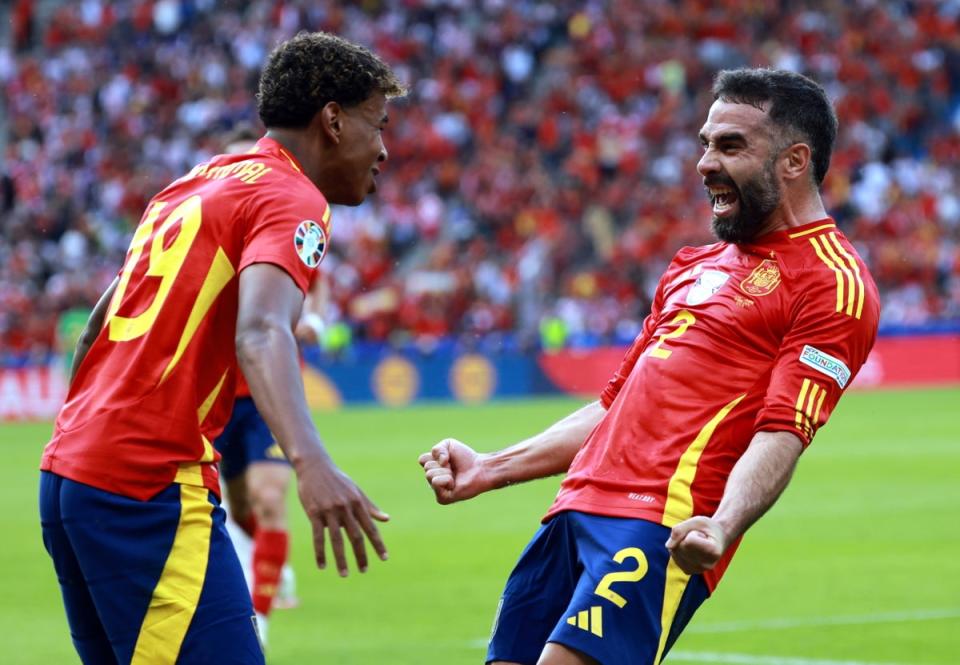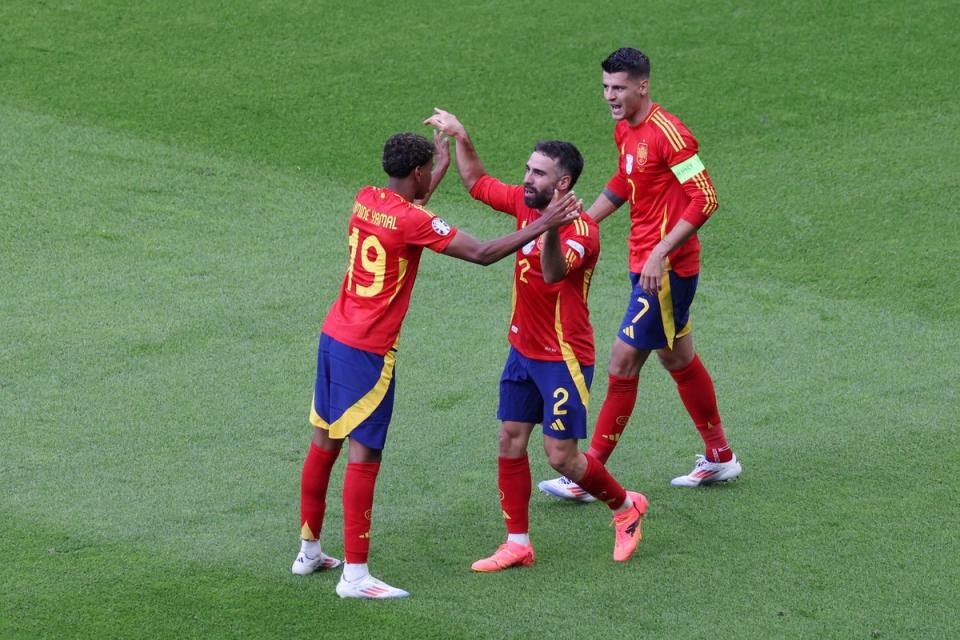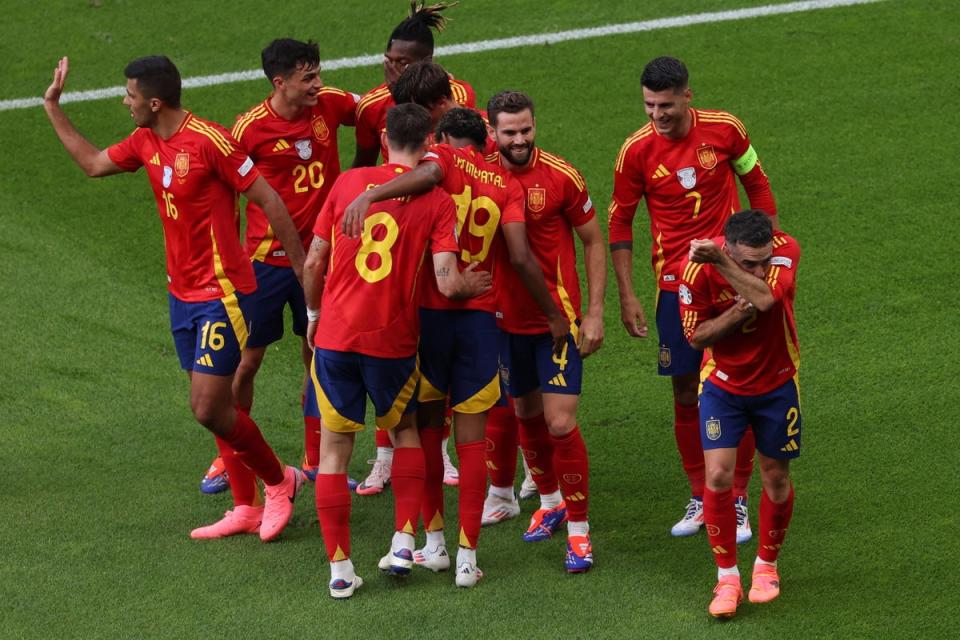Lamine Yamal dazzles as face of new Spain to validate overdue change at Euro 2024

A new Spain, in more ways than one. As Lamine Yamal, who was not even a year old when they won Euro 2008, became first the youngest footballer to play in a European Championships and then, before half-time, the youngest to set up a goal in one, Luis de la Fuente’s side made a break with the past.
With less possession and more potency, Spain looked like a team trying to cast off the influence of their champion sides. They had 47 per cent of the ball but scored three goals. After going out of successive World Cups in knockout games where they attempted over 1,000 passes each, but seemed to show precious little interest in scoring, this was Spain, but not as we knew them.
Nor, really, was it Croatia as we have come to know them: the great survivors, the tournament team whose powers of endurance have carried them deep into World Cups, were strangely supine. It was the Croatia of old, in that Luka Modric became the oldest player ever in a European Championships, in that they started with a midfield trio with 376 caps between them and the first substitute deployed was Ivan Perisic. The faces were familiar, but there was not the usual resilience.
For Spain, there was a fresh-faced newcomer, in Yamal. He had only played seven minutes of first-team football before this season. It has carried him further and faster than could have been anticipated; at 16, he replaced the Pole Kacper Kozłowski as the youngest player on this stage, some nine months younger. Perhaps a venue famous for Jesse Owens’s speed was a fitting venue for his major tournament debut but if everything has come quickly to Yamal, he has the attendant speed, accompanied by a touch of class. A capacity to glide away from opponents is allied with a lovely left foot.
It brought Yamal his assist, and Spain’s third goal before the break. It came as generations combined, a teenager setting up a 32-year-old.
Suddenly prolific, Dani Carvajal ghosted in to volley in Yamal’s cross. After his Champions League final strike, it was further evidence of the right-back’s predatory instincts. There was almost proof of Yamal’s. He was denied a goal by a fine Dominik Livakovic save. He may have had a second assist with a cross that flicked off Alvaro Morata’s thigh.
And yet part of the beguiling element to this Spain side is how De la Fuente has spliced together very different figures: the caricature of interchangeable passers is now very outdated; whereas the nominal wide men used to be more midfielders, now Yamal and Nico Williams offered genuine width. There is young and old – the oldest of all, Jesus Navas, did not get off the bench – and different types of players.

The other breakout star of a rout is scarcely a rookie. Nor, perhaps, a quintessential Spain midfielder of the 21st century. Maybe, after six seasons abroad, with no connection to Barcelona, Fabian Ruiz scarcely belongs to the Spanish school at all; he can feel more Italian in some respects. If the criticism is that some Spanish midfielders had too little end product, Ruiz delivered an assist and a goal inside four minutes.
In the process, he transformed the game. The first 28 minutes were a stroll in the Berlin sunshine. The next four brought a change of gear from Spain and two goals; Croatia, though, were culpable for both.
Perhaps it is too simplistic to attribute the opener to manager Zlatko Dalic’s decision to play Josko Gvardiol at left-back. But with the outstanding centre-back in the last World Cup reassigned, there was a sizeable gap between the two men ostensibly in the middle of the defence, Josip Sutalo and Marin Pongracic, as Ruiz fed the ball into the path of the on-rushing Morata. He slotted in a shot and, in the process, advanced beyond David Silva. A 36th Spain goal puts him on his own in fourth in their all-time list.

If the sense was that it was too easy, the same may be said when Spain scored a second. Skilful as Ruiz was to turn on the edge of the box, Marcelo Brozovic did too little to stop him before he drove in a shot, albeit with a slight deflection. It altered the atmosphere: with Croatians far outnumbering Spaniards in the stands, red and white checks covered much of the Olympiastadion.
Fervent followers had little to cheer. Marc Cucurella thwarted Croatia once, flying in to block Ante Budimir’s shot. Even when Croatia thought they had scored – Bruno Petkovic finding the net after Unai Simon had saved his penalty – the goal was chalked off because Perisic had encroached into the box to reach the rebound. But the spot kick itself – when Rodri may have been fortunate not to be sent off for tripping Petkovic – stemmed from Simon’s failed attempt to pass out from the six-yard line. It was another reminder to Spain that passing is not everything. Not the way De la Fuente’s side are playing.

 Yahoo Sports
Yahoo Sports 
